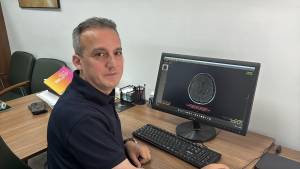From MRI to Machine Learning: Personalized Neurology at OMU
Ondokuz Mayıs University (OMU) Faculty of Medicine, Department of Neurology faculty member and President of the Turkish Neurological Society, Prof. Dr. Murat Terzi, stated that they aim to train artificial intelligence (AI) in collaboration with neuroscience graduate students and the Faculty of Engineering.
Prof. Dr. Terzi noted, “Artificial intelligence, alongside diagnostic tools such as MRI or blood tests, supports doctors in the decision-making process, enabling earlier and more accurate diagnoses. This allows us to tailor treatment processes according to each patient’s individual condition.”
Stressing the importance of the development of artificial intelligence, machine learning, and digital technologies in the field of medicine, Prof. Dr. Terzi said, “While research in this area has been rapidly increasing in recent years, we at OMU are particularly focused on AI applications in neuroscience and neurology. Our goal is to make early diagnoses and to develop personalized diagnostic and treatment methods by individualizing the course of the disease. In this direction, we analyze patients' brain and spinal cord MRI scans. With these imaging methods, we aim to more quickly and accurately diagnose conditions such as cerebral vascular occlusion or diseases like multiple sclerosis (MS).”
"We aim to develop patient-specific treatment strategies"
Providing details about the treatment processes applied to patients, Prof. Dr. Terzi said, “Our work is not limited to image analysis alone. We examine patients’ walking movements in detail to identify which parts of the nervous system are affected. This allows us to better determine the areas impacted by the disease. Additionally, for the diagnosis and follow-up of the disease, we prioritize imaging and biological data such as blood and cerebrospinal fluid samples. Moreover, we analyze patients’ speech and voice recordings to obtain additional data about their neurological condition. By combining all these diverse data sources, we aim to conduct comprehensive evaluations and develop precision medicine and personalized treatment strategies tailored to each patient.”
Targeted, personalized healthcare services
Highlighting their goal to accelerate diagnosis through the integration of AI and neurology, Terzi said, “This research requires a multidisciplinary approach. In addition to our neurology specialists, we collaborate closely with graduate students in neuroscience programs and engineers from the Faculty of Engineering. As a team, our aim is to train developing AI with accurate and reliable information, enabling this technology to effectively support doctors in diagnosing neurological diseases. AI supports physicians in the decision-making process alongside diagnostic tools like MRI and blood tests, facilitating early and accurate diagnosis. This allows us to plan the treatment process according to each patient's unique situation. In this way, we can offer more effective, targeted, and personalized healthcare services.”














